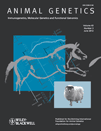
GENOME
Scope & Guideline
Pioneering Insights in Genetics and Biotechnology
Introduction
Aims and Scopes
- Genomic Diversity and Evolution:
Research exploring the genetic variation within and between species, examining evolutionary processes through comparative genomics, and studying the dynamics of genome evolution. - Molecular Mechanisms of Gene Regulation:
Investigations into the regulatory elements of genes, including transcription factors, epigenetic modifications, and non-coding RNAs that influence gene expression and cellular functions. - Applications of Genomics in Agriculture and Conservation:
Studies that focus on the use of genomic tools for crop improvement, animal breeding, and conservation genetics, highlighting how genomics can address challenges in food security and biodiversity preservation. - Environmental Genomics and Biodiversity:
Research utilizing genomic methods to assess biodiversity, understand ecological interactions, and monitor environmental changes through the analysis of environmental DNA (eDNA). - Pathogen Genomics and Host-Pathogen Interactions:
Exploration of the genomic basis of pathogenicity in microorganisms, including studies on antimicrobial resistance, virulence factors, and host responses to infections.
Trending and Emerging
- Environmental DNA (eDNA) Applications:
There is a growing emphasis on the use of eDNA for biodiversity assessments, species detection, and ecological monitoring, showcasing its potential in conservation biology and environmental studies. - Integration of Genomics and Machine Learning:
The incorporation of machine learning techniques in genomic research is on the rise, facilitating data analysis, predictive modeling, and the identification of complex patterns in large genomic datasets. - Functional Genomics and Gene Editing Technologies:
Research focusing on the functional characterization of genes, including the use of CRISPR and other gene editing technologies, is increasingly prominent, reflecting advancements in precision genetics and biotechnology. - Microbiome Genomics:
The study of microbial communities and their genomic characteristics is gaining traction, highlighting the importance of microbiomes in health, disease, and environmental dynamics. - Comparative Genomics Across Diverse Taxa:
There is an emerging interest in comparative genomics that spans a wide range of taxa, providing insights into evolutionary relationships, adaptations, and functional innovations across species.
Declining or Waning
- Traditional Cytogenetics:
Research that primarily focuses on classical cytogenetic techniques and karyotype analysis is becoming less frequent, as more advanced genomic methods provide deeper insights into chromosomal structures and functions. - Single-Species Genetic Studies:
The focus on genetic studies limited to single species without considering broader ecological or evolutionary contexts is waning, as interdisciplinary approaches gain traction in genomic research. - Basic DNA Barcoding Techniques:
While DNA barcoding remains relevant, the emphasis on basic methodologies without integrating advanced genomic tools and bioinformatics is declining, as researchers seek more comprehensive and informative approaches.
Similar Journals

GENETICS AND MOLECULAR BIOLOGY
Elevating knowledge in genetics and molecular biology.GENETICS AND MOLECULAR BIOLOGY, published by the SOC BRASIL GENETICA, is a prominent journal dedicated to the advancement of knowledge in the fields of genetics and molecular biology. Since its inception in 1998, this Open Access journal has served as a vital platform for researchers, professionals, and students to disseminate their findings and engage with the latest innovations and discoveries. With an impact factor that reflects its growing influence, GENETICS AND MOLECULAR BIOLOGY ranks in the Q3 category for both genetics and molecular biology as of 2023, indicating its position within the academic community. The journal is indexed in Scopus, highlighting its commitment to maintaining rigorous peer-review standards while providing wide-reaching access to quality research. Operating out of Ribeirão Preto, Brazil, it fosters a collaborative environment for academic discourse and research development not only in Brazil but also globally. The journal encourages submissions that explore a wide range of topics in genetics and molecular biology, making it an essential resource for anyone involved in these dynamic fields.

CURRENT GENETICS
Pioneering Insights in Genomic ScienceCURRENT GENETICS is a prestigious journal published by SPRINGER, dedicated to advancing the field of genetics through the dissemination of high-quality research. With a notable impact factor and ranking in the Q2 category for both Genetics and Medicine (miscellaneous) as of 2023, it firmly establishes itself as a significant resource for the academic community. The journal’s comprehensive scope explores the latest findings in genetic research, along with accompanying interdisciplinary studies, providing a platform for researchers to share innovative ideas and methodologies. ISSN: 0172-8083, E-ISSN: 1432-0983, stands testament to its commitment to scholarly excellence. While Open Access options are not currently available, CURRENT GENETICS remains accessible to a broad audience, promoting a rich exchange of knowledge that supports the vast and evolving discipline of genetics. Since its inception in 1979 and through its converged years till 2024, this journal has played a crucial role in confronting scientific challenges and promoting advancements in genomic medicine and molecular biology. As such, it is an essential read for researchers, professionals, and students keen to remain at the forefront of genetic research.

NAR Genomics and Bioinformatics
Connecting Researchers with Cutting-edge Genomic InsightsNAR Genomics and Bioinformatics, published by Oxford University Press, is a leading open-access journal that has been at the forefront of research in genomics and computational biology since its inception in 2019. With an impressive impact factor and a consistent ranking in the Q1 category across multiple fields—namely Applied Mathematics, Computer Science Applications, Genetics, Molecular Biology, and Structural Biology—this journal stands as an influential platform for disseminating innovative findings and methodologies. Researchers and professionals have the opportunity to engage with high-quality, peer-reviewed articles that reflect the latest advancements in both theoretical and applied aspects of bioinformatics. The journal's commitment to open access ensures that groundbreaking research is accessible to a global audience, fostering collaboration and knowledge sharing within the scientific community. The country of publication is the United Kingdom, with a dedicated editorial team striving to maintain the highest standards of academic excellence.

NUCLEUS-INDIA
Catalyzing progress in the field of Molecular Medicine.NUCLEUS-INDIA is a prominent academic journal that delves into the intricate realms of Cell Biology, Genetics, Molecular Biology, and Molecular Medicine. Published by SPRINGER INDIA, this journal has been a reliable source of innovative research since its inception in 2011. With an ISSN of 0029-568X and an E-ISSN of 0976-7975, NUCLEUS-INDIA stands out in the scientific community, functioning as a critical platform for the dissemination of groundbreaking findings and advancements within its fields of study. Despite being categorized in the lower quartiles as of 2023, it remains an important contributor to the literature, providing insights that influence both academic and practical perspectives in genetics and molecular sciences. Researchers, professionals, and students alike can benefit from its diverse array of articles addressing contemporary challenges and innovations. The journal is located at 7th Floor, Vijaya Building, 17, Barakhamba Road, New Delhi 110 001, India, and aims to enhance the scholarly discourse in biology by publishing works that push the boundaries of current understanding.

MOLECULAR GENETICS AND GENOMICS
Empowering Research Through Open Access KnowledgeMOLECULAR GENETICS AND GENOMICS is a distinguished journal published by SPRINGER HEIDELBERG that serves as a pivotal platform for the communication of cutting-edge research and developments in the fields of genetics, molecular biology, and medicine. With an ISSN of 1617-4615 and an E-ISSN of 1617-4623, this journal has established itself since its inception in 1994 as a significant resource for researchers aiming to explore the complexities of genetic interactions and their implications in various biological systems. The journal is indexed in Scopus, with respectable rankings in the Genetics, Molecular Biology, and Biochemistry categories, showcasing its position within the academic community. It is categorized in the 2023 rankings as Q3 in Genetics, Q2 in Medicine (miscellaneous), and Q3 in Molecular Biology, indicating its relevance and quality in the scientific discourse. The journal also promotes open access, ensuring that researchers and professionals can easily share and advance knowledge in the rapidly evolving disciplines of molecular genetics and genomics. As the journal continues to bridge the gap between experimental and theoretical research, it presents a vital space for innovation, fostering collaborations and scholarly exchange among its readership.

G3-Genes Genomes Genetics
Your Gateway to Cutting-Edge Genetic InsightsG3-Genes Genomes Genetics is a prominent open access journal published by Oxford University Press, Inc., dedicated to advancing the field of genetics and genomics. Since its inception in 2011, the journal has become a vital resource for researchers, professionals, and students, featuring high-quality, peer-reviewed articles that cover a broad spectrum of topics within genetics, including clinical genetics and molecular biology. With an impressive standing reflected in its 2023 Scopus rankings, which positions it in the Q2 category for Genetics (Clinical) and Q1 for Medicine (Miscellaneous), G3 remains at the forefront of scholarly communication in these disciplines. The journal's commitment to open access ensures that cutting-edge research is accessible to a global audience, stimulating collaboration and innovation in the field. For those eager to explore the latest in genetic research, G3 serves as an indispensable platform, inviting contributions that push the boundaries of scientific understanding.

GENETICA
Bridging the Gap Between Genetics and Practical ApplicationsGENETICA is a prominent journal published by SPRINGER, dedicated to advancing the field of genetics and its applications across various biological disciplines, including animal science, plant science, and insect science. Since its inception in 1919, the journal has consistently served as a vital platform for researchers and professionals to disseminate high-quality research findings that explore the genetic bases of biological phenomena. With its current scope spanning from 1943 to 2024, GENETICA holds a commendable position in the academic community, as evidenced by its Q2 ranking in both animal science and insect science, and its active contribution to interdisciplinary studies in genetics. Although the journal does not offer open access, it remains accessible through institutional subscriptions and libraries, ensuring its vital research is widely circulated. Researchers, professionals, and students alike will find GENETICA an invaluable resource for the latest discoveries and methodologies in the ever-evolving landscape of genetics.

NATURE REVIEWS GENETICS
Advancing the Frontiers of Genetic Discovery.NATURE REVIEWS GENETICS, published by NATURE PORTFOLIO, stands as a leading journal in the field of genetics, boasting a remarkable reputation reflected in its Q1 ranking across multiple categories including Genetics, Clinical Genetics, and Molecular Biology. With an impressive percentile of 99th in both Genetics and Clinical Genetics, as well as a solid rank in Molecular Biology, this journal is pivotal for researchers, professionals, and students alike who seek to stay informed on the latest advancements and comprehensive reviews in genetic research. The journal's scope encompasses a wide array of topics, providing in-depth insights from fundamental genetic principles to clinical applications, underscoring its importance in bridging basic science and medical practice. Though not an open-access publication, it remains accessible through various academic institutions, enhancing its reach and influence within the scientific community. With publication years spanning from 2000 to 2024, NATURE REVIEWS GENETICS continues to shape the future of genetics research and education.

International Journal of Genomics
Advancing genomic knowledge for a global audience.International Journal of Genomics is a pivotal open-access publication under the esteemed HINDAWI LTD, dedicated to advancing the fields of genomics, biochemistry, genetics, and molecular biology. Established in 2013, this journal aims to disseminate innovative research findings and foster scholarly dialogue among researchers, professionals, and students alike. With a robust Impact Factor reflective of its commitment to quality, the journal has achieved a Q3 ranking in Biochemistry, Genetics, and Molecular Biology, as well as notable placements in Pharmaceutical Science, indicating its broad relevance and influence in these interconnected fields. The journal is indexed in esteemed databases, ensuring high visibility and accessibility for published works. As an open-access journal, it prioritizes the sharing of knowledge across borders, facilitating greater collaboration and advancement in genomic research globally. Join the academic community in exploring the vast potential of genomics through the International Journal of Genomics, based in Egypt, and reaching audiences worldwide from its London office.

ANIMAL GENETICS
Exploring the Genetic Blueprint of Animal LifeANIMAL GENETICS, published by WILEY, is a leading journal in the fields of Animal Science and Zoology, with a commendable Q1 classification for 2023, reflecting its critical role in advancing research and knowledge in animal genetics. Established in 1986, this journal has become a cornerstone for professionals, researchers, and students alike, providing a platform for innovative research that explores the genetic underpinnings of animal biology. With an ISSN of 0268-9146 and an E-ISSN of 1365-2052, it boasts a significant impact in both agricultural and biological sciences, as indicated by its ranking of #74 out of 490 in its category on Scopus, positioning it in the 85th percentile for Animal Science and Zoology. Readers can access high-quality, peer-reviewed articles that not only illuminate current advancements but also foster future research directions. While currently not an open access journal, ANIMAL GENETICS remains vital for anyone engaged in the exploration of genetics and its applications in medicine and beyond, with a continual commitment to publishing findings that shape the future of animal breeding, conservation, and genetics research.